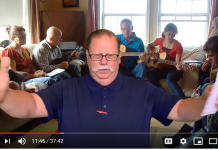Did you know that every one of you has a song? Paul told the Corinthians, “each and every one of you has a psalm [song]” (1 Cor. 14:26). Religious tradition has been pulpit/sermon centered, and as a result the participation of the whole body, as described by Paul in 1 Cor. 14, has been lost. Likewise, singing in the early church came to expression through the brothers and sisters in the gathering, “each and every one of you has a psalm [song].” Remember, they had no hymnals. They had no collection of Jesus songs to choose from. The songs sprang up from those present.
As history moved on, the church became more like an institution and less like a family. Just as the pulpit took the place of body participation, music moved “up front” in the form of choirs. A form of congregational singing appeared in the Protestant Reformation, but it was formal and scripted.
In the 1800s and 1900s hymnals became more common, and each denomination had their own collection of songs.
Since the 1960s many churches still have choirs, but more and more “worship bands” have become an established feature in religious services. Music in churches has moved “up front” for sure.
The 1970s until now has seen Contemporary Christian Music (CCM) explode commercially. Certainly much beautiful music has come forth from very gifted people.
But I think we must return to a basic question: is it possible we have forfeited tremendous blessings and hindered the expression of Jesus by eliminating rank-and-file believers as a primary source for music and songs?
Like it or not, we connect musical articulation to those who have some prowess in musical skills, even specific training for voice and instruments. Remember, however, that Paul’s words, “each of you has a song,” were addressed to people who, for the most part, were musically illiterate. In fact, 94% of all persons in the First Century were illiterate. This highlights the reality that Christ in the saints brought forth all kinds of utterances, including songs, to build up the ekklesia – by the Spirit, without formal training.
Paul also told the Corinthians, “each of you has a teaching.” This does not mean that every person has the gift of teaching, but it does mean all can share in the teaching that goes on in an open meeting. Hebrews 5 said to the body, “when you should be teachers, you have need to be taught . . .” Recall that in Paul’s thought even singing is “teaching” (Col. 3:16). So when he said that each one had a song, this does not mean all are gifted musically, but it does mean that as the Lord leads all can contribute to the musical expression in the body.
1 Cor, 14:26 underscores the fact that traditional “worship services” are far afield from the openness Paul desired by saying, “you may all prophesy one by one.” As R.C. Sproul confessed years ago; “in Protestant worship, for the most part, we sit and listen to a sermon.”
Paul envisioned a gathering much more robust than that – a body gathering where each one could bring their portion of Christ to the body-feast, eating and drinking of Christ.
Ask the Lord if there is not a song (or more) in you that Christ has purposed to be part of the grass that will help pasture His flock. Perhaps one has the words and another the melody. There are untold ways His songs can come to fruition. Frank Viola encouraged the saints at a 2007 Dallas, TX, conference:
Let’s raise the bar on the songs we sing in our house churches. The greatest songs I have ever sung in my life did not come from the Vineyard, they didn’t come from Maranatha Music, or Integrity, or whoever you want to name. They came from the pen of brothers and sisters who were living in organic church life…who were non-professional musicians. They wrote them out of the soil of body life. And those songs (I am as honest as I can be) trump anything I’ve ever heard in the institutional church. Do you know that the early Christians wrote their own songs? Do you know they were profoundly Christ-centered? They had great depth, and they were experiential. They were written out of the soil of their experience of Christ in the body of Christ. Would to God that we would take our cue from the early Christians and write our own songs. Some of the songs that ordinary non-professional Christians have written will blow your mind. Home-grown songs, right out of the soil of the life of the church. Centered on Christ and with depth. It can be done. Brothers and sisters, I challenge you: Let’s raise the bar. There are songs that are waiting to be written out of your experience
of Christ in the church.
Why is “each one of you has a song” essentially meaningless now in groups of believers? Paul meant a whole lot more by that phrase than for a person to choose a song from a printed hymnal of some sort. Are we not missing a deep well of edification by relegating musical input to experts? Doesn’t Paul’s phrase imply a rich grassroots source for spiritual songs – the saints themselves?
— Jon Zens, September 14, 2020









































[…] En Inglés https://godsleader.com/each-and-every-one-of-you-has-a-song/ […]
Back in the 50’s our “Christian houses” had sweet times of home grown music… I miss that!
hacia falta decir!…y se dijo!!!!